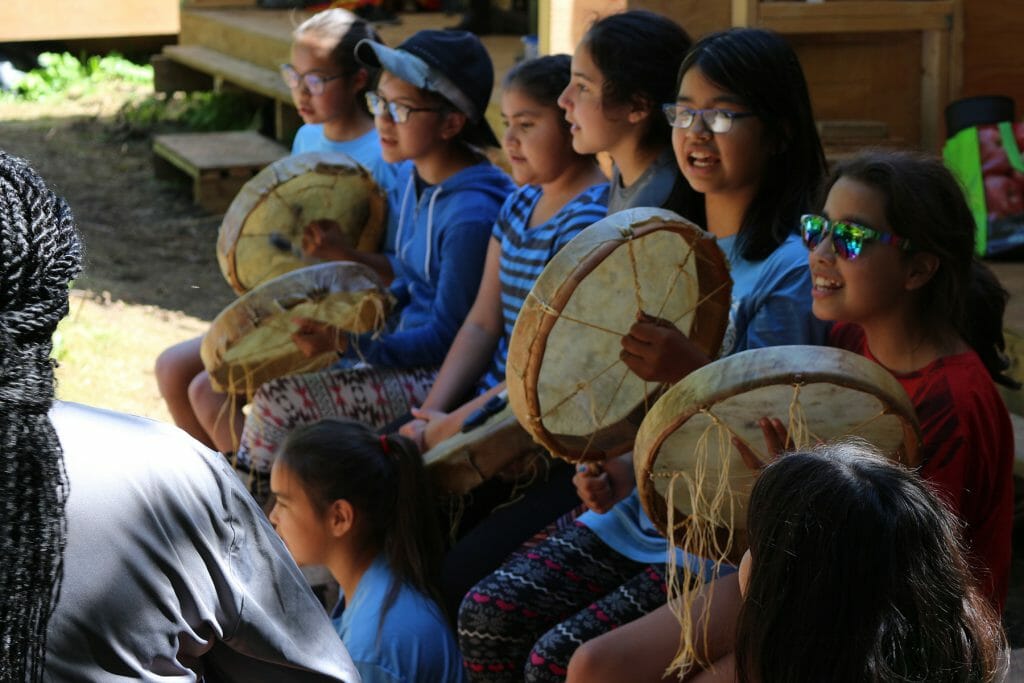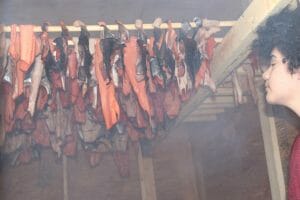Estimated Reading time

2 Mins
Haisla Youth Connect with Their Culture at Camp

This story appears courtesy of Marine Plan Partnership. View the original story here.
Located just half an hour from Kitimat, Weewanie Hot Springs Park is a completely different world than most of us inhabit. Accessible only by water, it is a remote wilderness destination where Xbox and iPads know no purpose. It was also home to 17 Haisla youth for 10 days last summer as they participated in the Haisla Nation’s revived cultural camp. The focus of the camp, which was made possible by the Haisla Nation Council and funded in part by MaPP, was to teach participants about Haisla culture and to be respectful of Haisla resources.
MaPP’s North Coast Marine Plan encourages capacity building in First Nations and local communities. An important first step for greater participation in stewardship, monitoring and enforcement, and economic development activities is to teach youth the skills they need in order to participate effectively and contribute to sustainable development in their communities.
It was such a great experience and I hope more youth will embrace opportunities to connect with nature and our culture.

“We struggle with capacity building in the areas of self-governance and environmental stewardship; we don’t have enough people with those skills right now and there’s a need for more youth recruits,” said Mike Jacobs, the Haisla Nation’s fisheries manager and one of the camp’s organizers. “The camp was an immersive experience and exposed youth to Haisla culture through the traditional use of natural resources.”
Each day participants learned traditional practices such as canoeing, crab fishing and long lining for halibut. They processed fish and ate traditional foods. Daily hikes allowed for exploration including along hereditary trap lines. The community cultural coordinator with the Haisla Nation gave a language lesson while another guest taught cedar weaving.
Another camp highlight was a visit from Shelley Bolton and Terry Nyce from the Spirit of Kitlope dance group, who taught the youth traditional drumming songs and dances.
“Everyone made a drum to keep and all the youth took part in the singing,” said Shelley. “Some dove right into it, while others took a while to come out of their shells. By the end, though, they couldn’t get enough. Nowadays our lives are so full of technology. This camp showed the youth that they can enjoy themselves without TV. It was such a great experience and I hope more youth will embrace opportunities to connect with nature and our culture.”
“We don’t have the opportunities to pull crab traps or to be out on the land like we used to,” said Angie Maitland, an early child education coordinator with the Haisla Nation who was another of the camp’s organizers. “The camp changed that. All 17 participants want to go again and they made long-lasting friendships. Everyone grew from the experience, including staff.”
“It was a life-changing opportunity,” added Mike. “The youth didn’t know these resources were right on their doorstep. Familiarizing them with their territory is a high priority for the Haisla Nation Council. People have become disconnected from resource management. Our intent is to offer more camps and to broaden the age range. We want to reconnect youth in a way that will bring them happiness and prosperity.”
In 2017, Coast Funds approved $230,000 for the Haisla Fisheries Commission 2017/2018 season, a portion of which was used to support the youth cultural camp.
